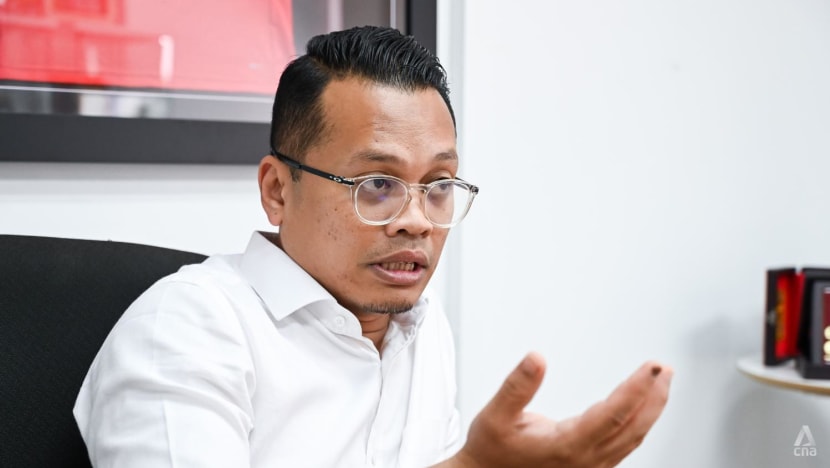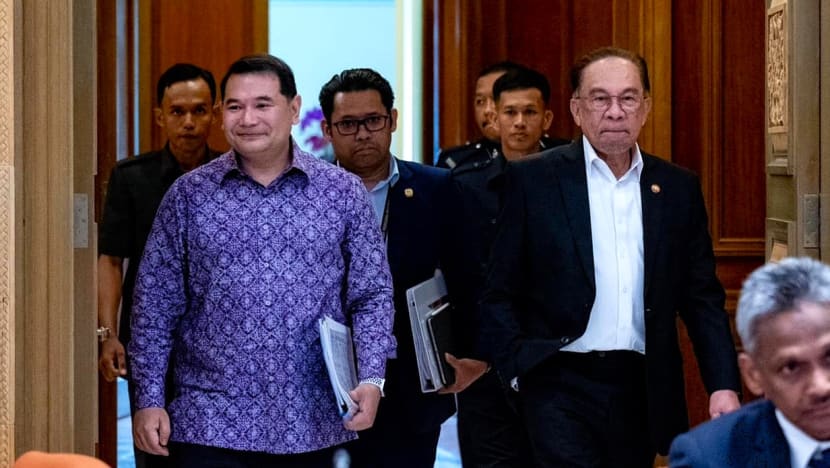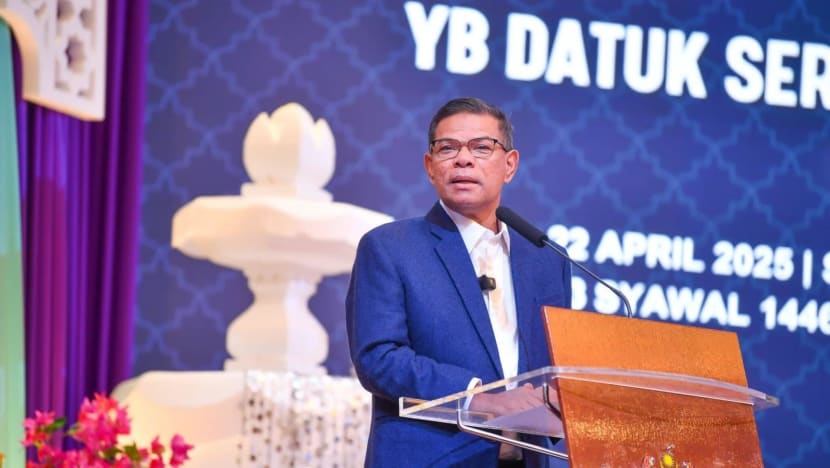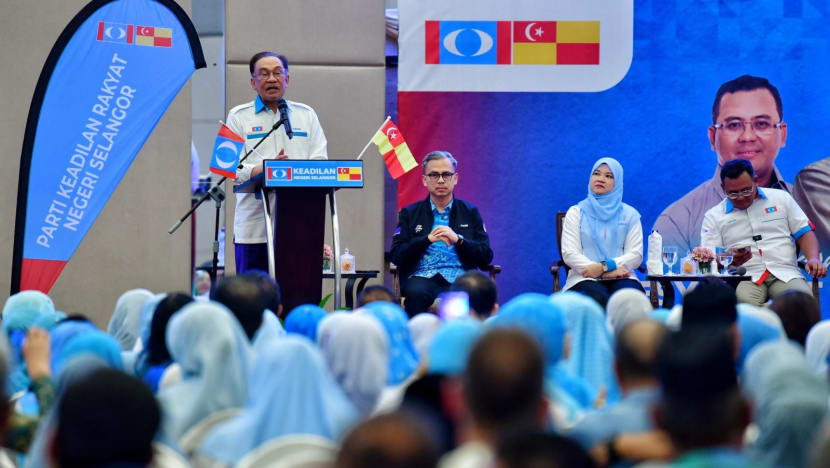‘Who after Anwar?’: Malaysia premier’s PKR gripped with election fever as hopefuls jostle to be his successor
KUALA LUMPUR: Political waters in Prime Minister Anwar Ibrahim’s Parti Keadilan Rakyat (PKR), the linchpin component in Malaysia’s ruling government, are being roiled ahead of crucial internal elections next month that will provide clues to the country’s unsettled leadership succession.
Anwar, who is PKR president, is widely expected to retain his position without any contest at the party congress on May 24. But it will be the final term for the 77-year-old because the party’s constitution caps the tenure of its president at two consecutive terms.
PKR sources tell CNA that bitter battles are shaping up for the other leadership slots as PKR’s top brass jostle to position themselves as potential successors to Anwar.
All eyes are on the likelihood of a contest for the post of deputy president, which is currently held by Economy Minister Rafizi Ramli, despite an earlier call by Anwar that his Number Two in the party should “be allowed to continue”.
Rafizi has publicly declared that he will be defending the position and PKR sources said the potential contenders for the deputy presidency are Home Minister Saifuddin Nasution Ismail and Selangor Chief Minister Amirudin Shari.
“The big question is ‘who after Anwar’, and there is a sizeable group of members who don’t think Rafizi should be given easy passage,” said a senior chief of a PKR division, who has already begun campaigning for Saifuddin to make a bid for the party’s No. 2 position.
“There are many upcoming leaders who want to position themselves before the next general election.”
How the contests, including for the four vice-president positions, play out at the party leadership congress on May 24 will largely depend on the outcomes of the divisional elections of PKR chapters nationwide that were completed on Sunday (April 20).
These divisional level elections will not only decide the top office bearers and delegates that each chapter will appoint to attend and vote at the party’s leadership congress next month.
The divisional polls also determine the level of support for potential contenders in the upcoming party leadership elections and will eventually shape the political battles that will take place, PKR officials noted.
DIVISIONAL UPSETS SPARK TALK OF CABINET RESHUFFLE
The divisional elections that ended on Apr 20 saw many leadership contests turning into proxy wars among the party’s top brass, with Team Rafizi suffering high-profile casualties.
Natural Resources and Environmental Sustainability Minister Nik Nazmi Nik Ahmad, who is said to be aligned with Rafizi, lost his Setiawangsa division chief position in the capital Kuala Lumpur to film producer and screenwriter Afdlin Shauki, who is widely believed to be aligned with Anwar.

Another Rafizi acolyte, Deputy Minister of Energy Transition and Water Transformation Akmal Nasir, failed to defend his post of chief of the Johor Bahru PKR division after losing to the chapter’s former youth chief Taufiq Ismail.
These and other upsets have even sparked talk of a Cabinet reshuffle, which Anwar ruled out on Monday, saying “this concerns the party, there's no question of state or federal government matters”.
Allegations of vote-rigging have also clouded the divisional elections, and a PKR central leadership council meeting will be held on Wednesday at the request of council members, party secretary-general Fuziah Salleh confirmed on Sunday. She, however, denied it was an emergency meeting.
PKR operatives close to Anwar, who are tracking the party’s divisional polls, noted that sentiment has turned negative in recent years towards Rafizi, who is widely seen to be aloof. Detractors also say that he has not shown himself to be a team player or taken on the duties of building the party infrastructure.

“Rafizi’s relations with members of the Pakatan Harapan (PH) coalition have also been very distant and we need to rely more on Saifuddin,” said a deputy president of a coalition partner, who asked not to be identified.
Supporters of Rafizi argue he has been sidelined by Anwar. They say Anwar has not been able to work with his previous deputies, citing former PKR deputy president Azmin Ali, who defected to the rival Parti Pribumi Bersatu (Bersatu) after a fallout with the current premier.
While Rafizi's political clout has been on the wane, Anwar has been increasingly relying on Saifuddin for important assignments, according to sources from Anwar’s camp.
The 61-year-old Saifuddin, a long-time Anwar loyalist, was responsible for the formation of PKR together with the premier’s wife, Wan Azizah Wan Ismail.
Saifuddin is regularly tapped to carry out behind-the-scenes negotiations with counterparts from China and the Middle East, noted senior government officials.
PKR politicians aligned with Saifuddin noted that his supporters have begun canvassing recently elected division chiefs on how they would respond to a possible contest for the deputy president position. That is because the division chiefs will have the power to select delegates who will vote at the party congress next month.
“He (Saifuddin) remains undecided, but the results of the recent divisional elections are encouraging and he will likely go for it,” said a long-time aide to the Home Minister.

CRITICAL JUNCTURE
The upcoming party polls come at a crucial juncture for PKR, an ethnic Malay-dominated multi-racial party.
While the party enjoys a pivotal position in national politics and its leaders occupy key Cabinet positions, such as the finance and home portfolios, PKR’s perch is seen to be wobbly, mainly due to Malaysia’s deeply fractured political landscape.
The general election in November 2022 failed to produce an outright winner and Anwar assumed the premiership only after his PH coalition led by PKR formed a unity government with the Barisan Nasional pact led by the United Malays National Organisation (UMNO).
PKR, which has 31 elected representatives in Parliament, relies heavily on its chief ally in PH, the Democratic Action Party (DAP), which has 40 Members of Parliament in the 222-member lower house.
Public support for PKR is also considered by political analysts to be hollow.
PKR officials claim that it has just over one million registered members, but political analysts noted that the party lacks a national footprint and struggles to attract support from the country’s politically divided Malays, who make up more than 60 per cent of the population.
Its core supporters are mainly from multi-racial urban and semi-urban communities.
“PKR’s big problem is that it has not used its incumbency as the lead player in government to build a power base that will make it a lasting political institution,” said Ibrahim Suffian of independent polling outfit Merdeka Centre, adding that the upcoming party polls “provides for a chance to create a new leadership that can focus on making the party a serious player”.
LACKING CLEAR IDEOLOGY?
The chief weakness afflicting the party is that it is bereft of a clear ideology, apart from being against corruption, abuse of power in government and cronyism.
This is unlike other established parties such as UMNO, which champions the rights of the ethnic Malay community, and the DAP, which has long fought for equal rights for all Malaysians.
Established in 1998 as Parti Keadilan Nasional, PKR was a product of the political fallout between former premier Mahathir Mohamad and Anwar, who at the time served as deputy premier.
Both men clashed over how to manage the country’s economic crisis during Asia’s financial turmoil that began in the summer of 1997 and that in turn led to Anwar’s sacking from government and subsequent conviction and jailing over corruption and sexual misconduct.
Public anger over Mahathir’s treatment of his erstwhile successor, particularly Anwar's violent beating while in custody by the then-police chief, triggered some of the country’s worst public demonstrations and street protests. It also brought together politicians aligned to Anwar, non-governmental organisations and social activists to form PKR.
While PKR may not have the deep roots of established parties, such as UMNO and DAP, political analysts noted that there are features and traits the party could leverage to broaden its appeal with ordinary Malaysians, particularly the ethnic Malay community.
PKR leads the Malay-dominated state governments of Selangor and Negeri Sembilan, two of the country’s most powerful economic growth engines after Penang, which is led by its ally DAP.
“If PH, particularly PKR and Anwar’s administration, can deliver (the) goods on the economy and alleviate the cost of living, the Malays will find the party more appealing compared to its rivals,” said Merdeka Centre’s Ibrahim, referring to UMNO and the opposition right-wing Parti Islam SeMalaysia (PAS), which together are in competition for the Malay ground.
TESTY TIES, FACTIONALISM
The other challenge that has long plagued PKR is that the party is seen as top-heavy, with Anwar largely dictating the political agenda.
Supporters of Rafizi allege the premier entertains very little feedback, particularly from factions aligned with the PKR deputy president.
In the PKR election in 2022, Rafizi emerged as the most likely successor to Anwar when he soundly defeated Saifuddin, who was widely believed to have the tacit backing of the party president.
Rafizi’s rising profile following the 2022 internal PKR election led to factionalism, with senior party leaders aligning themselves in cliques behind the president and deputy president. That in turn made the already testy ties between him and Anwar more strained.
Party insiders noted that factions aligned to Anwar see Rafizi as an impatient deputy.
After the country’s 2022 general election, Rafizi was appointed as minister to the once-powerful Economic Affairs portfolio.
But Anwar went on to strip the ministry of many of its powerful functions in overseeing major government initiatives, such as the award of government contracts, and left it supervising the national statistics department, noted political analysts and government officials.

NEW LEADERS EMERGING IN PKR
Senior PKR officials told CNA that a transformation is taking shape in the party, which is part of Anwar’s push to bring in a mix of senior leaders such as Saifuddin, the premier’s daughter Nurul Izzah Anwar and other new faces to form a strong second echelon leadership structure.
While a new three-year term as president would be his last, few, if any, of PKR’s top officials expect Anwar, who is also Finance Minister, to give up the premiership should the PH coalition remain in power.
But new players, many of whom are aides to the premier, have emerged in the recent divisional elections.
Nurul Izzah won unopposed for the Permatang Pauh division in Penang, while the premier’s political secretary Azman Abidin won unopposed in the Bandar Tun Razak division in Kuala Lumpur.
A fast-rising star is Muhammad Kamil Abdul Munim, who is the premier’s political secretary at the Treasury.
Muhammad Kamil is expected to be installed next month as the chief of PKR’s youth wing, widely considered a stepping stone to higher positions in government.
“The face of the party is still Anwar, but a transformation is taking place (at PKR),” said a businessman who is a member of the premier’s inner circle.
免责声明:投资有风险,本文并非投资建议,以上内容不应被视为任何金融产品的购买或出售要约、建议或邀请,作者或其他用户的任何相关讨论、评论或帖子也不应被视为此类内容。本文仅供一般参考,不考虑您的个人投资目标、财务状况或需求。TTM对信息的准确性和完整性不承担任何责任或保证,投资者应自行研究并在投资前寻求专业建议。
热议股票
- 1
- 2
- 3
- 4
- 5
- 6
- 7
- 8
- 9
- 10